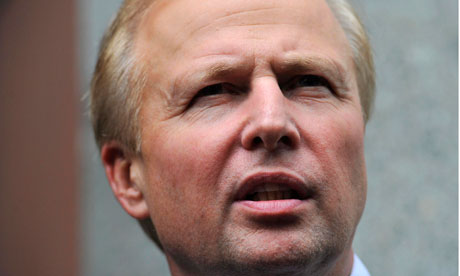
BP has raked in profits of more than £3bn in the past three months – just a year after the near-terminal Deepwater Horizon disaster – but faces renewed demands for its break-up from some City quarters.
The oil group reported a profit of $5.6bn (£3.4bn) as surging crude prices allowed it to wipe out the $17.1bn loss from the same period last year, when an explosion on the BP-operated rig in the Gulf of Mexico caused the world's biggest accidental offshore oil spill.
Motorists' organisations expressed anger at the vast profit earned from an oil price that has averaged more than $100 a barrel and pushed up petrol prices to nearly 140p per litre. Stephen Glaister, director of the RAC Foundation, said: "BP's increased profits will please shareholders but they do nothing for motorists who ultimately fund them through higher fuel prices."
He added: "This will do nothing to dampen calls from such bodies as the Fédération Nationale d'Automobile, which represents 35m drivers, for the competition authorities to look into transparency in crude oil and oil product prices."
However, BP shares fell 2.6% to 463.25p as analysts pushed for more details of the group's strategy and expressed disappointment over numbers that fell short of expectations.
While BP has focused on cleaning up the damage done to both the environment and its corporate image by the Deepwater accident, investors noted strategic shifts by rivals that have boosted their own shareholder returns.
Bob Dudley, BP's chief executive, would not be drawn on radical proposals such as separating the group's "upstream" operations – oil and gas exploration and production – from its smaller "downstream" activities, such as refining and petrol stations. Nonetheless, Dudley refused to rule out unwinding the big is best, "supermajor" strategy pursued by Lord Browne, BP's boss until 2007.
"Well, we're not ruling it in or out. What we do often, frequently, is review our portfolio and consider all options," Dudley said. "Right now our priorities in 2011 have got to be to continue to stabilise the company and reduce the uncertainties of the environment we're in. That's absolutely our highest priority. But strategy-wise, we've been very active in the past year and will continue to be so."
This week analysts at HSBC estimated that BP had lost $77bn in value compared with its European peers since the Gulf spill.
Dudley added: "We are certainly not patient inside the company. We feel a great sense of urgency around where our share price is and what we believe to be the value of the company. So, shareholders I think also are impatient."
That unease over strategic direction has been made more acute by the failure this year of a proposed alliance with Rosneft, the Russian state-owned oil group.
In a note yesterday headlined "Strategy, what strategy?" Arbuthnot Securities said that BP had done nothing in the wake of strategic shifts by rivals such as ExxonMobil, Shell and ConocoPhillips, which has won plaudits in recent years for announcing a stream of asset sales that have helped fund higher dividends.
"BP appears to be running a 'business as usual' strategy and we are not convinced that the market will put up with this for much longer," said Arbuthnot analyst Dougie Youngson.
Options include selling off BP's North Sea and US assets in order to focus on emerging markets such as Brazil, India and Russia. Another is to take cash out of its TNK-BP Russian joint venture, possibly via a market listing.
BP has taken a provision of $40bn on its books for Deepwater Horizon, including a $20bn compensation fund, which has paid out $6.8bn so far. The head of BP's American operations, Lamar McKay, said that the pace of applications for compensation payouts had slowed, suggesting that the "spillionaire" phenomenon– a phrase coined for those who have pursued more spurious claims in the wake of the disaster – may be coming to an end.
"The claims volume has slowed down," said McKay. "We're moving from response into recovery now. The indications in tourism and seafood are good.'
A drop in group-wide oil and gas production also contributed to the negative stockmarket reaction, with Deepwater again playing a key role. Production fell 11% to 3.4m barrels of oil per day, amid a US government moratorium on new drilling in the Gulf and the sale of oilfields to pay for the compensation fund.

